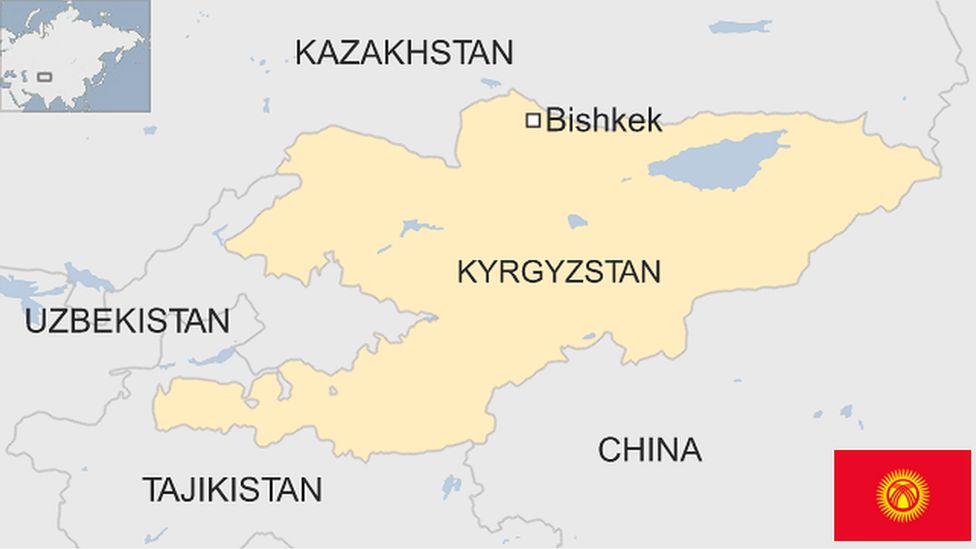Kyrgyzstan country profile
- Published

A Central Asian state bordering China, Kyrgyzstan became independent with the collapse of the Soviet Union in 1991.
It has some oil and gas and a developing gold mining sector, but relies on imports for most of its energy needs.
Resentment at widespread poverty and ethnic divisions between north and south have spilled over into violence, and three presidents have been swept from power by popular discontent since independence.
Settled by Kyrgyz tribes from southern Siberia in the 17th Century, the area was ruled by various regional powers before coming under Russian and then Soviet rule.
Most of its six million people are Turkic-speaking Muslims. Russia maintains a military airbase in the country.
- Read more country profiles - Profiles by BBC Monitoring
KYRGYZ REPUBLIC: FACTS
- Capital: Bishkek
- Area: 199,951 sq km
- Population: 7 million
- Languages: Kyrgyz, Russian, plus Uzbek, Uyghur, Kipchak
- Life expectancy: 67 years (men) 76 years (women)
LEADER
President: Sadyr Japarov
Frontrunner Sadyr Japarov won a landslide victory in the January 2021 presidential election.
He also acquired sweeping new powers after voters amended the constitution in a referendum.
Mr Japarov effectively ran the country after President Sooronbay Jeenbekov was ousted in a popular revolt in October 2020 over rigged parliamentary elections.
A nationalist opposition politician, Sadyr Japarov spent four years in exile during the rule of President Almazbek Atambayev and his successor and ally Mr Jeenbekov, and was imprisoned for taking a rival politician hostage until his supporters freed him in October.
He pledged to make tackling corruption his priority, and to maintain close relations with Russia.
MEDIA
Television is the most popular medium. There are state-run networks and more than a dozen private stations. Russian networks have a large audience.
Most radio stations are privately-owned; a handful broadcast nationwide. The newspaper sector is experiencing declining sales and financial hardship.
TIMELINE
Some key dates in Kyrgyzstan's history:
8th Century - Arab invaders conquer Central Asia, including what is now Kyrgyzstan, and introduce Islam.
10th-13th Centuries - Kyrgyz people migrate southwards from the Yenisei River region in central Siberia to the Tian-Shan region.
1685 - Kyrgyz people settle in the area that is now Kyrgyzstan; area conquered by the Oirats, a Mongol people, after centuries of Turkic rule.
1758 - The Oirats are defeated by the Chinese Manchus, and the Kyrgyz become nominal subjects of the Chinese empire.
Early 19th Century - The Kyrgyz come under the jurisdiction of the Uzbek khanate of Kokand, to the west.
1876 - Russian forces conquer the khanate of Kokand and incorporate what is now Kyrgyzstan into the Russian empire.
1917-23 - Civil war breaks in the wake of the 1917 October Revolution in Russia.
1920s and 1930s - Soviet land reforms aimed at creating large state-owned farms upset the traditional Kyrgyz way of life, which is based on nomadic livestock-herding; Kyrgyz Communist Party established as the sole legal party; many members of the Kyrgyz intelligentsia who express dissent are imprisoned or executed.
1936 - Kirgiz Soviet Socialist Republic (SSR) - also known as Kirgizia - becomes a constituent republic within USSR.
1991 - Kyrgyzstan acquires its present name, dropping Kirgizia, and declares independence. Askar Akayev is president.
2005 - Mass protests force President Akayev from office in the Tulip Revolution. Kurmanbek Bakiyev wins a landslide victory
2010 - Opposition protests spread from northern Kyrgyzstan to capital Bishkek, sweeping President Kurmanbek Bakiyev from power.
2021 - Sadyr Japarov wins election with enhanced executive powers, after President Sooronbay Jeenbekov was ousted the previous year.
2022 - There are armed clashes, including the use of artillery, along much of the border between Kyrgyzstan and Tajikistan.
Related Topics
- Published24 March 2023
- Published23 August 2023
- Published24 March 2023
- Published25 August 2023
- Published24 March 2023